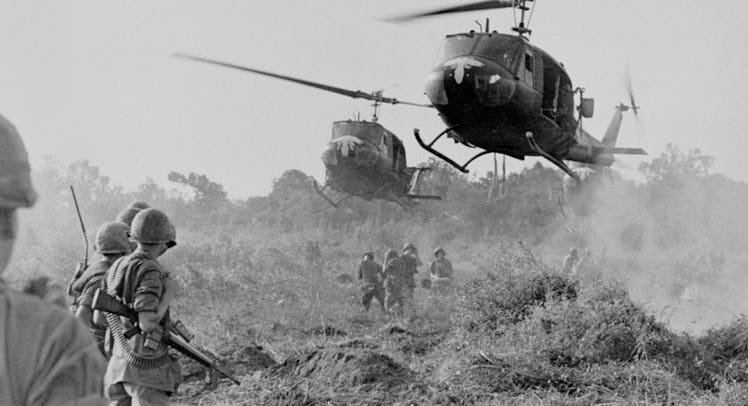My Father the Vietnam Vet
And what it's like to be the first son in my family not to serve his country.

My name is Alex Bulmer. I am the son of Jeff Bulmer, a former military helicopter pilot who served in Vietnam for two tours. From 1965 to 1968 he served as an infantry rifleman in the US Marine Corps. He returned on a second tour, from 1969 to 1971 as a helicopter pilot in the 101st Airborne Division, 158th Aviation Battalion, B & C Companies.
My father was born in 1947. I was born in 1996 when the war was long behind him. But it never left him completely. Growing up, even before my parents got divorced, we didn’t go out to eat often. When my twin brother, my older sister, and I did happen to eat out with my dad, I always noticed that he refused to sit with his back to the door of the restaurant. He liked corners best, where he had an eye on the exit. The other thing that sticks with me is that if anyone dropped a piece of silverware onto a plate with a clatter or the kitchen door slammed closed with a bang, he would tense up. His neck muscles would strain and his biceps twitch. He had a temper, a really hot one, but in those moments he didn’t seem mad so much as frustrated.
He never kept his time in Vietnam a secret from us. But he also wouldn’t talk about it in depth. The things he saw and the things he did were not for children. My dad comes from a long line of soldiers. His father, an abusive car salesman who settled the family in rural Illinois, served in World War II. His grandfather in World War I. The line is unbroken back to the Civil War, where Andrew Bulmer served in the Maine regiment of the Union Army. My brother and I are the first to break the continuity. This my father does not ever let me forget.
My dad was both proud and wary of being a veteran. On the bumper of his Buick, he had a Vietnam Veteran bumper sticker. He frequently wore a Vietnam Helicopters Pilot Association baseball cap. There were small reminders around the house too, mementos, tchotchkes, printed matter. Since he continued to be a helicopter pilot — a skill he learned in the service — the war frequently came up. I know that when he returned stateside after his last tour, he was not welcomed back with open arms and that that continues to bother him today.
I remember being a kid and begging him to tell me about Vietnam. He always said, “Oh, later, when you’re older.” When I got older, he said, “Another time.” I just turned 21. Now that I can legally have a beer with him, he’s started to open up. I know, for instance, that he killed people, some in close combat and perhaps hundreds — not in close combat — as a helicopter pilot. I know that he saw people killed, including his best friend, a man named Charlie Raider, who died after stepping on a land mine while on a search-and-destroy mission with my dad. I know that my father didn’t know why he was in Vietnam or what he was fighting for. I know he was focused on staying alive.
Whether or not it’s strange to have a father who has killed people, I couldn’t say. It’s like having divorced parents. I have no point of comparison. But I do think the war created a blockage between my father and I. It was so much a part of my father and yet something he couldn’t and didn’t want to share with his family. It wasn’t just that Vietnam was considered a stain on our military, derided both home and abroad. My father had seen things and done things that didn’t seem compatible with being a good dad, which he was and is. So there was always a bit of an eclipse when it came to my understanding of my father.
My dad is seventy now and he seems like he’s still on a mission. After the war, he became a commercial helicopter pilot and has been flying ever since. Recently, he’s been flying to forward operating bases in Afghanistan and also in the Central African Republic. His latest mission is to get me to join the military. I know it would complete my dad’s life if he saw me graduate as a Marine or from the Naval Academy. I’m sure he doesn’t want me to go to war and certain he doesn’t want me to get injured. But I think if I were a soldier, like he was and his dad was and his grandfather was and so on, we could share the darkness of war and I could join him in the shade.
— As told to Joshua David Stein
This article was originally published on